Abstract
In a double-blind crossover trial, the effect of 4 week daily ingestion of eight cups of regular coffee (corresponding to 504 mg caffeine) vs eight cups of decaffeinated coffee was studied. Blood pressure, heart rate and urinary catecholamines were measured in eight healthy, young volunteers. In both groups, regular coffee immediately led to a significant increase in mean blood pressure (+ 3 and + 5 mm Hg respectively). The difference between both groups, however, existed only in the first 3 to 5 days of ingestion of regular coffee. On day 5 after ingestion of regular coffee, and thereafter in weekly intervals, no significant increase in catecholamine excretion was observed. The data suggest that long-term consumption of large amounts of coffee leads to only a small and transient rise in mean blood pressure. This may be due to an adaptation phenomenon. Therefore, continuous heavy coffee ingestion (eight cups/day for 4 weeks) by young persons does not appear to involve a risk of the development of hypertension.
Full text
PDF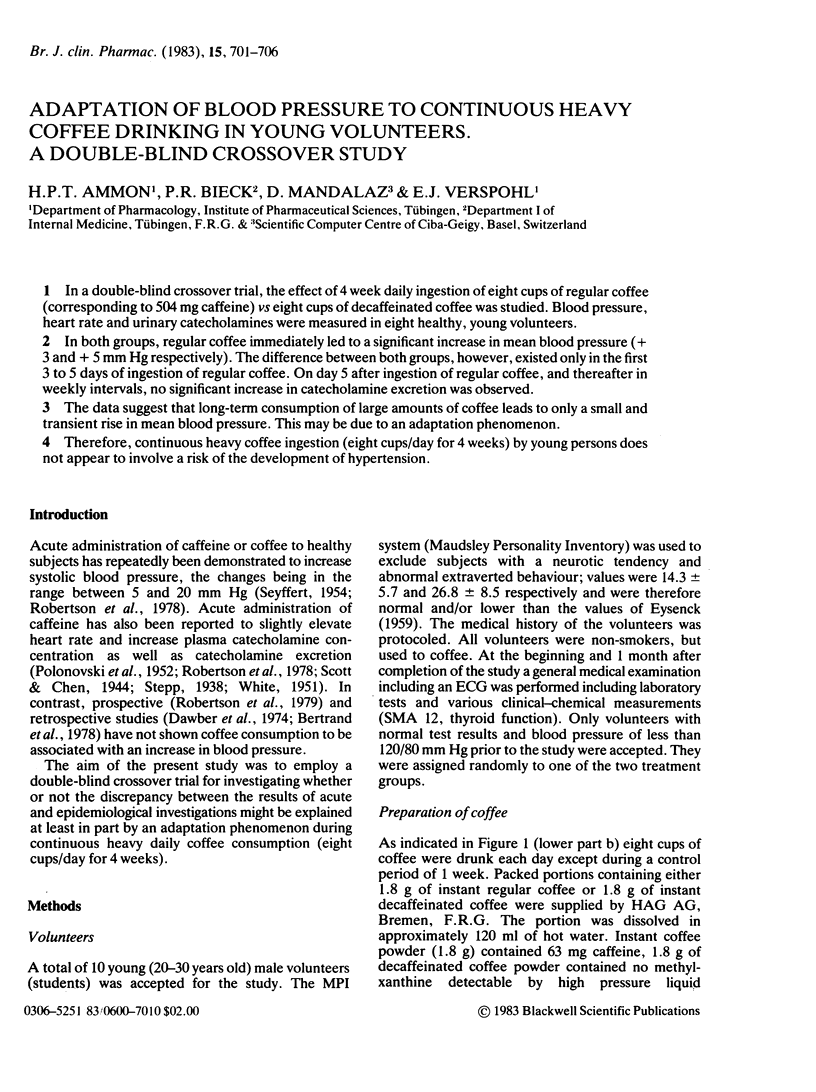
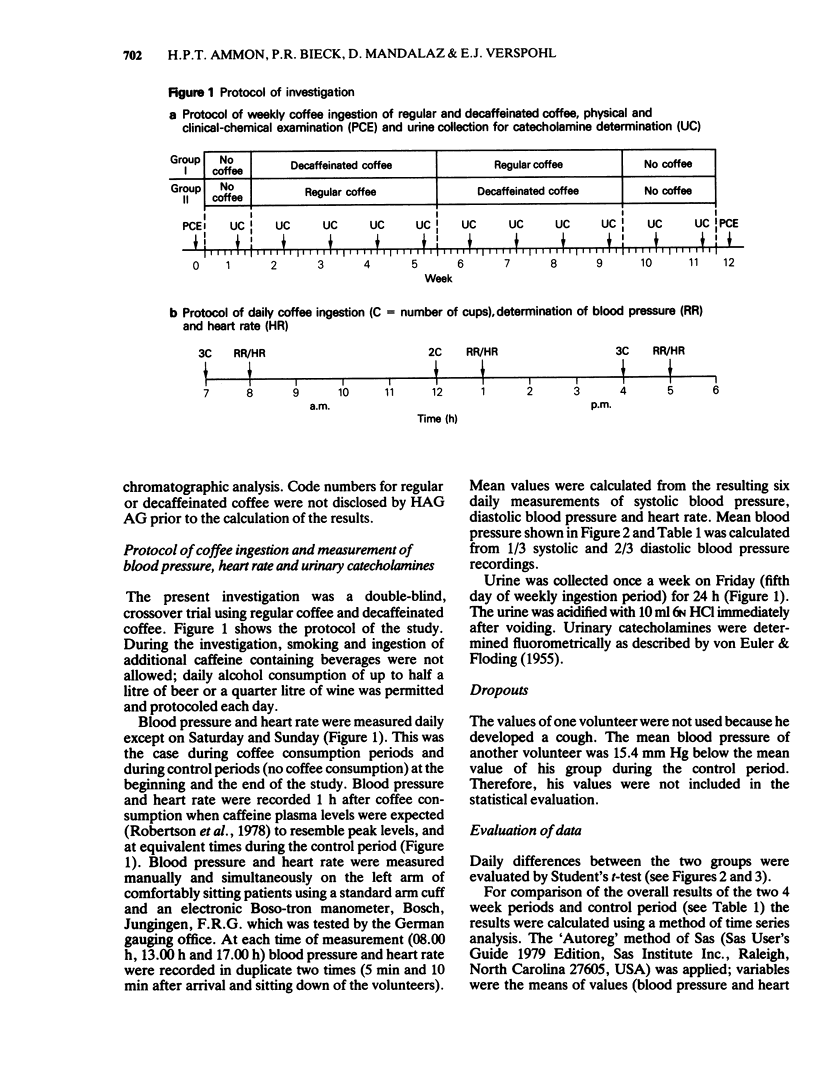
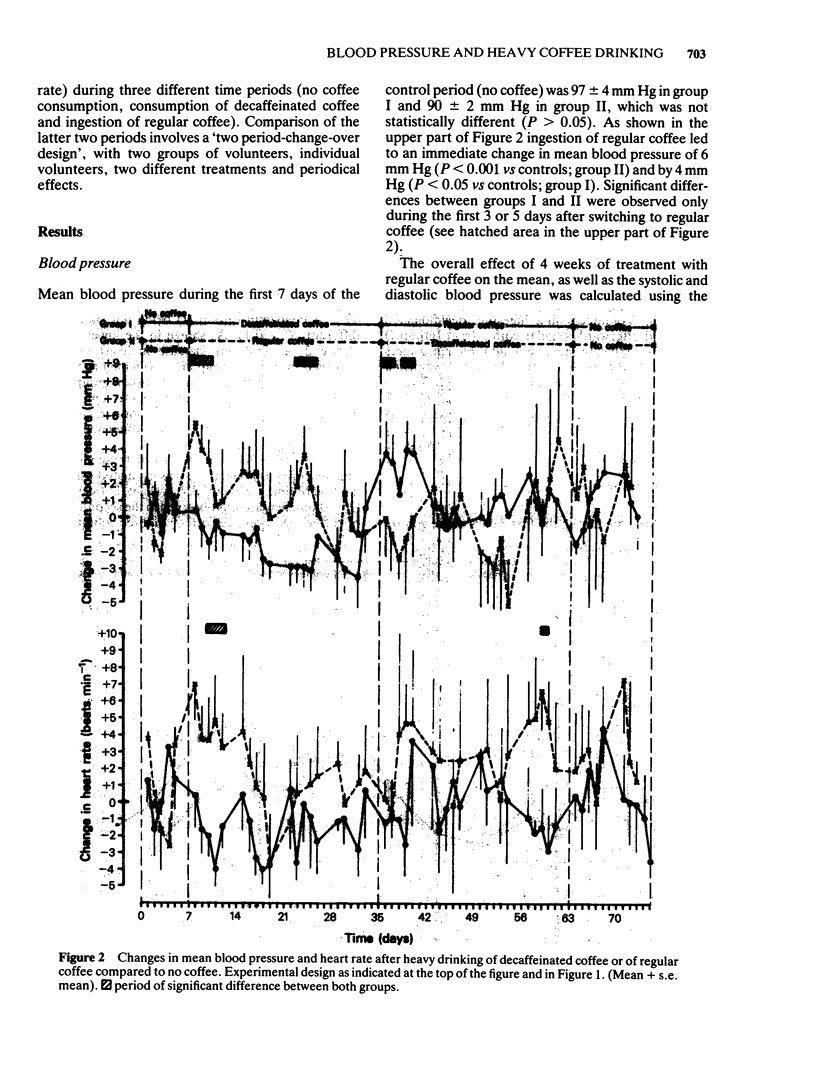
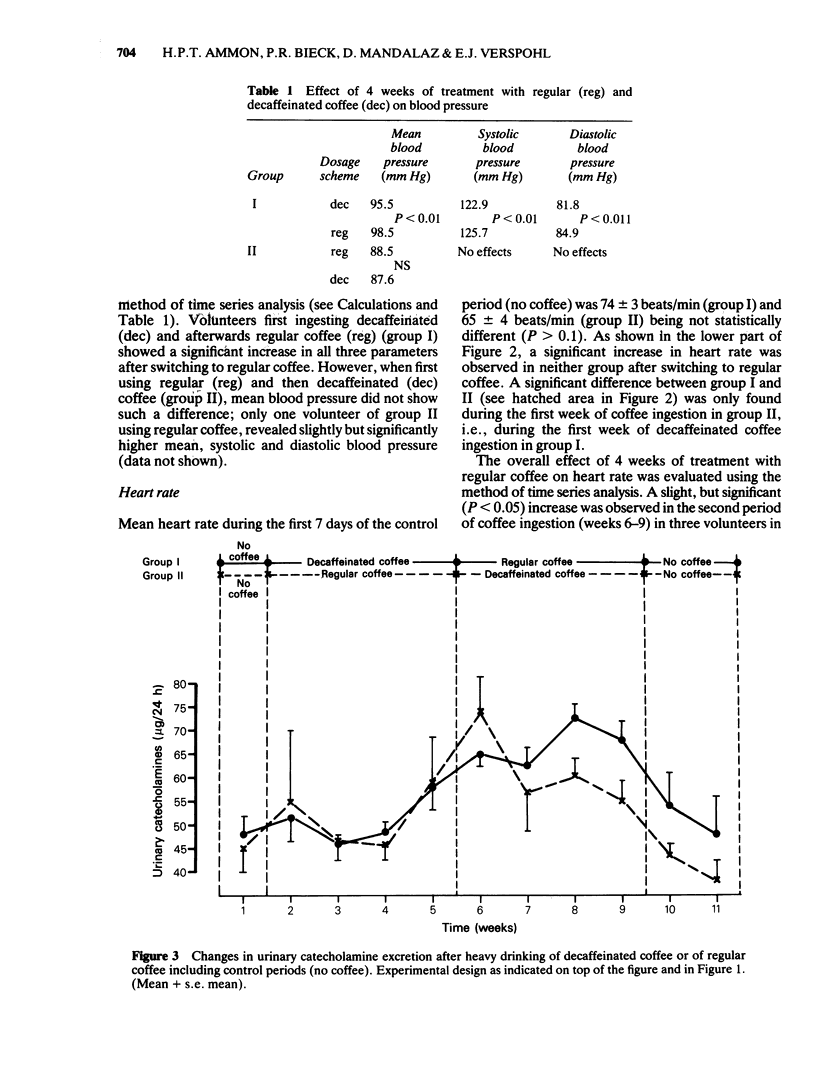
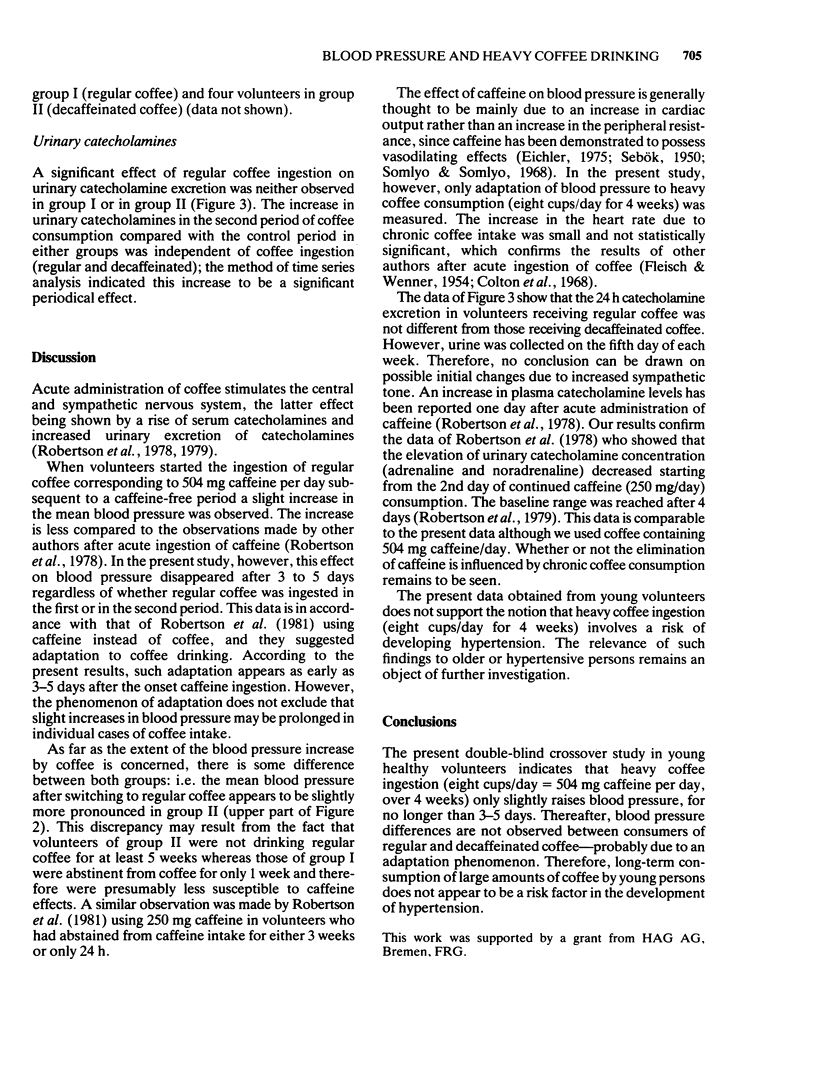
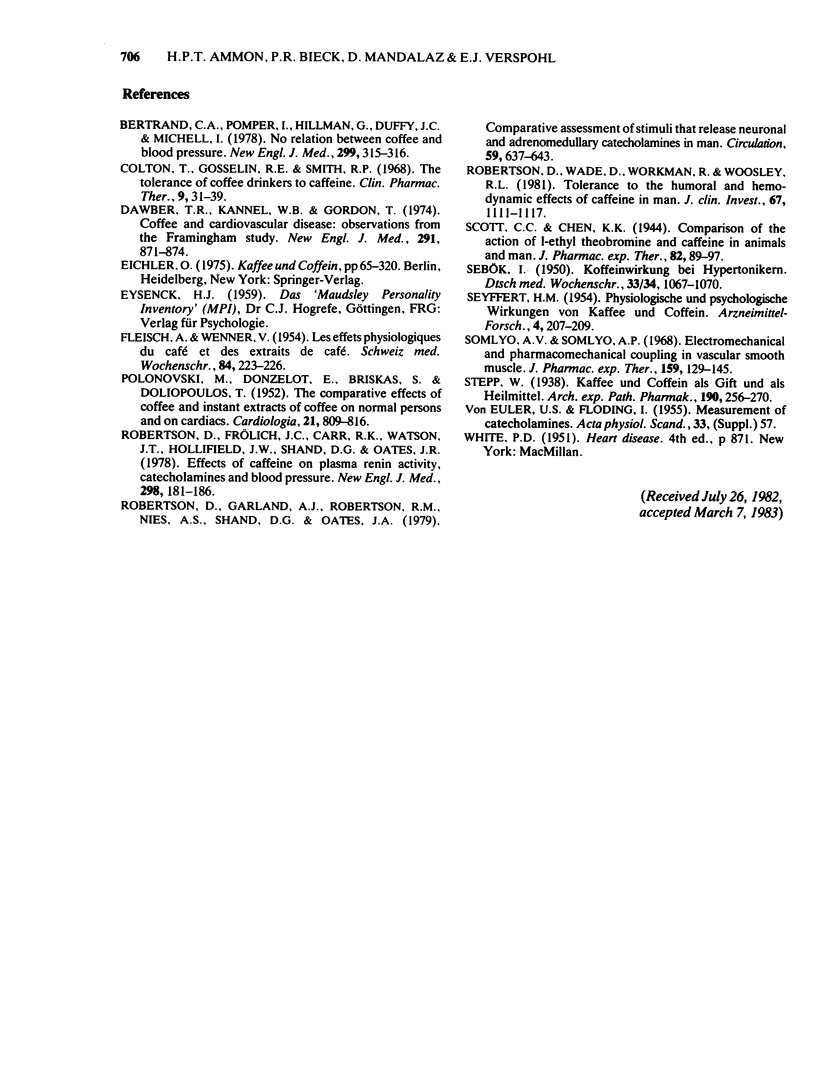
Selected References
These references are in PubMed. This may not be the complete list of references from this article.
- Bertrand C. A., Pomper I., Hillman G., Duffy J. C., Micheli I. No relation between coffee and blood pressure. N Engl J Med. 1978 Aug 10;299(6):315–316. doi: 10.1056/NEJM197808102990625. [DOI] [PubMed] [Google Scholar]
- Colton T., Gosselin R. E., Smith R. P. The tolerance of coffee drinkers to caffeine. Clin Pharmacol Ther. 1968 Jan-Feb;9(1):31–39. doi: 10.1002/cpt19689131. [DOI] [PubMed] [Google Scholar]
- Dawber T. R., Kannel W. B., Gordon T. Coffee and cardiovascular disease. Observations from the framingham study. N Engl J Med. 1974 Oct 24;291(17):871–874. doi: 10.1056/NEJM197410242911703. [DOI] [PubMed] [Google Scholar]
- FLEISCH A., WENNER V. Les effets physiologiques du café et des extraits de café. Schweiz Med Wochenschr. 1954 Feb 13;84(7):223–226. [PubMed] [Google Scholar]
- POLONOVSKI M., DONZELOT E., BRISKAS S., DOLIOPOULOS T. The comparative effects of coffee and soluble extracts of coffee on normal persons and on cardiacs. Cardiologia. 1952;21(6):809–816. doi: 10.1159/000165261. [DOI] [PubMed] [Google Scholar]
- Robertson D., Frölich J. C., Carr R. K., Watson J. T., Hollifield J. W., Shand D. G., Oates J. A. Effects of caffeine on plasma renin activity, catecholamines and blood pressure. N Engl J Med. 1978 Jan 26;298(4):181–186. doi: 10.1056/NEJM197801262980403. [DOI] [PubMed] [Google Scholar]
- Robertson D., Johnson G. A., Robertson R. M., Nies A. S., Shand D. G., Oates J. A. Comparative assessment of stimuli that release neuronal and adrenomedullary catecholamines in man. Circulation. 1979 Apr;59(4):637–643. doi: 10.1161/01.cir.59.4.637. [DOI] [PubMed] [Google Scholar]
- Robertson D., Wade D., Workman R., Woosley R. L., Oates J. A. Tolerance to the humoral and hemodynamic effects of caffeine in man. J Clin Invest. 1981 Apr;67(4):1111–1117. doi: 10.1172/JCI110124. [DOI] [PMC free article] [PubMed] [Google Scholar]
- SEBOK I. Koffeinwirkung bei Hypertonikern. Dtsch Med Wochenschr. 1950 Aug 25;75(33-34):1067–1070. doi: 10.1055/s-0028-1117610. [DOI] [PubMed] [Google Scholar]
- SEYFFERT H. M. Physiologische und psychologische Wirkungen von Kaffee und Coffein. Arzneimittelforschung. 1954 Mar;4(3):207–209. [PubMed] [Google Scholar]
- Somlyo A. V., Somlyo A. P. Electromechanical and pharmacomechanical coupling in vascular smooth muscle. J Pharmacol Exp Ther. 1968 Jan;159(1):129–145. [PubMed] [Google Scholar]


